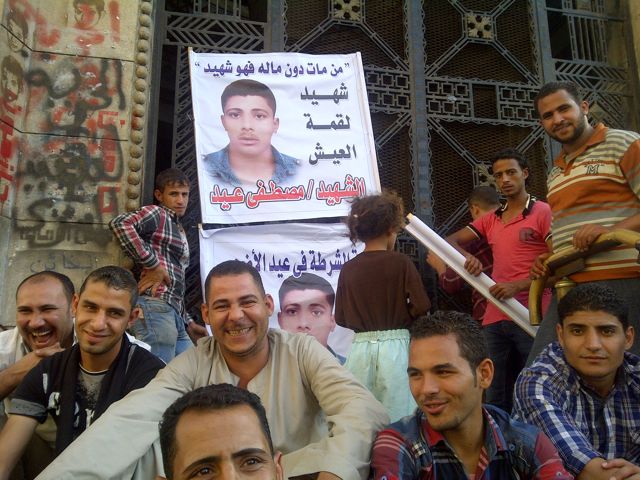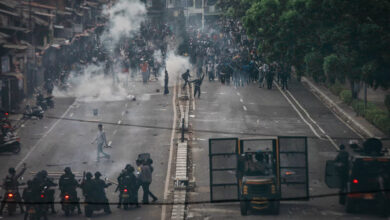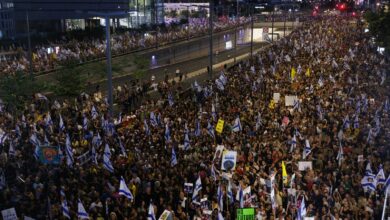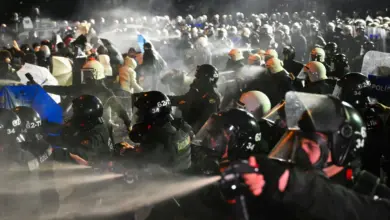
Around 30 street vendors gathered in front of the Public Prosecution's office on Sunday, demanding retribution for Mostafa Eid, who was killed during clashes with security forces last Monday as they attempted to clear Giza Square of vendors.
“I want my son back; I want retribution,” Eid's mother Gannat Tolba told Egypt Independent.
Eid, who was 22, sold fruit with his father ever since he was 6 years old to help take care of his five younger sisters, according Tolba.
Street vendor Moataz Darwish, who has sold clothes in Giza Square for years, says he witnessed the events that led to Eid's death.
He says when police raided Giza Square, pushing vendors out, officer Hesham Nasr attacked Eid's father, beat him and tried to handcuff him.
The younger Eid tried to protect his father and pushed the officer back, Darwish recounts, asking the officer not to arrest his father but take him instead. The officer lashed out and clashes broke out between security forces and street vendors, according to the account.
The street vendors retreated from the square, but Eid returned because he thought his father was left behind. He was then ambushed by two officers and Nasr shot him in his left side, killing him, says Darwish.
Nasr claimed he was attacked by street vendors who insulted security forces, abducted two police officers and stole their firearms, according to an article published in privately owned Al-Watan newspaper on 17 October. He added that later the vendors started throwing Molotov cocktails at security forces and attacking them with batons.
However Darwish denied the claims, saying, “If we had abducted two officers we wouldn't have let them go after they killed Mostafa [Eid].”
Darwish and other street vendors said there was a history of animosity between Eid and Nasr, who often forced Eid to give him fresh fruit for free in exchange for the officer turning a blind eye to his illegal fruit selling.
''We have been selling fruit and products in the street for over 20 years and nothing like this has ever happened to us before … this is worse than under [ousted President Mubarak's] reign,'' he said.
Under Mubarak, police were known for corruption and brutality against civilians.
However, over a year and a half since the 25 January revolt, many believe that little has changed and it will take more effort to change decades of embedded corruption inside the Interior Ministry.
On 9 October, Al-Nadeem Center for Rehabilitation of Victims of Violence issued a report stating that at least 34 civilians were killed and 88 tortured at the hands of police forces during Mohamed Morsy's first 100 days as president.
One of Morsy's main vows to the Egyptian people during his campaign was to remove street vendors blocking roads to solve Cairo's chronic traffic congestion within his first 100 days of rule.
There have been several government campaigns to remove street vendors from a number of areas, particularly prominent squares. However, the government hasn't offered an alternative for street vendors who barely get by on their daily profits from selling modest products.
“We haven't been able to return back to selling in Giza Square ever since the clashes … we're too scared,” street vendor Ahmed Ragab says.
“I can get killed at any day while I'm working on the street just because I'm trying to make ends meet,” he adds.
Magda Kandil, former executive director of the Egyptian Center for Economic Studies, tells Egypt Independent that this kind of informal work lacks a respectable appearance, discipline, contributes to Egypt's chronic traffic problem and lacks an organized structure.
“However, the government should bargain with street vendors and offer them an alternative so they can secure a living in a dignified way,” she adds.
The economy has plunged ever since the 18-day revolt that toppled Mubarak and many Egyptians have found themselves out of work.
Kandil said there were no official statistics on street vendors, estimating that they represent around 20 percent of the informal work force that do not have stable jobs or contracts that guarantee their rights.
Informal workers make up around 40 percent of Egypt's total work force, according to Kandil.




